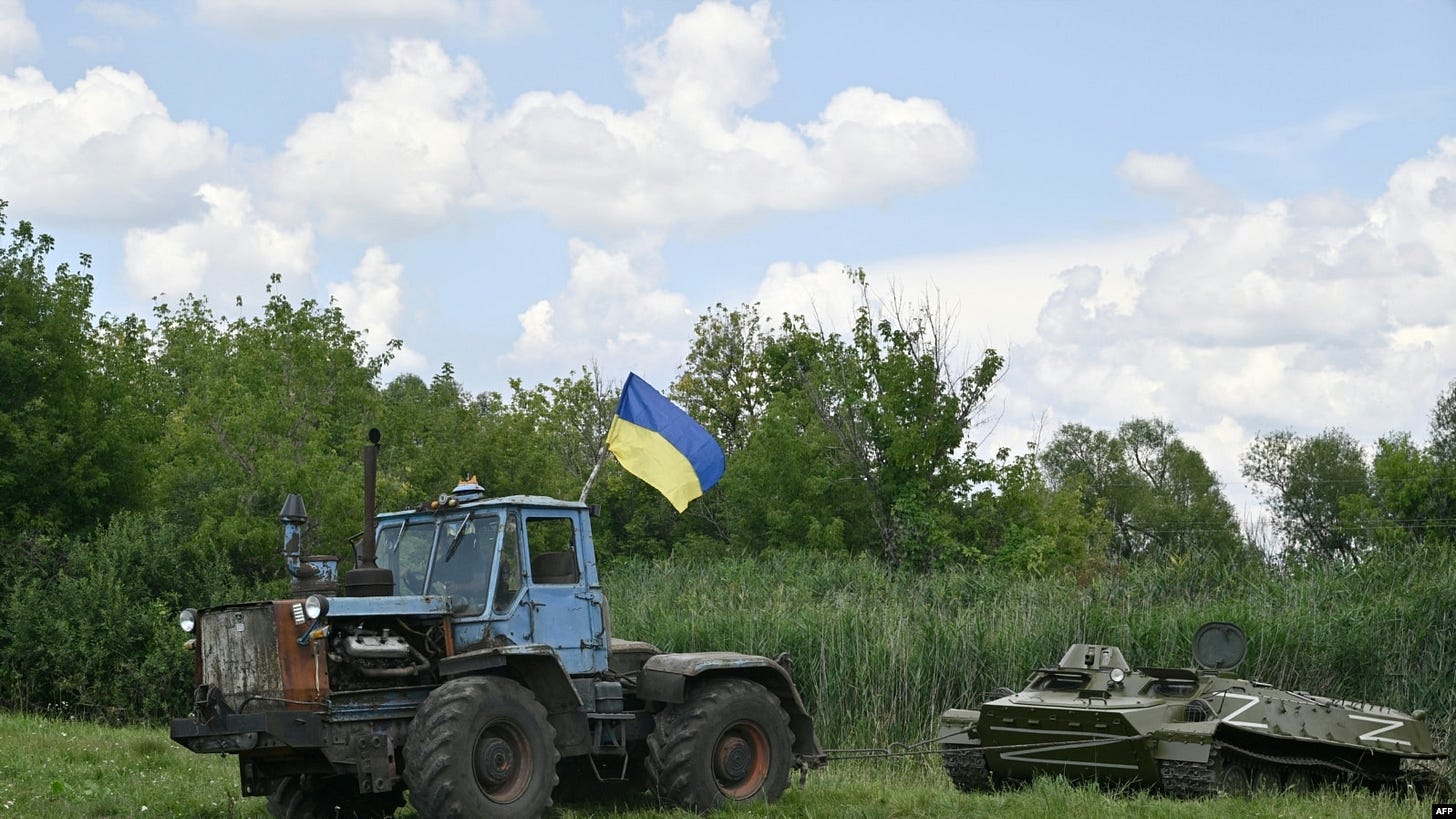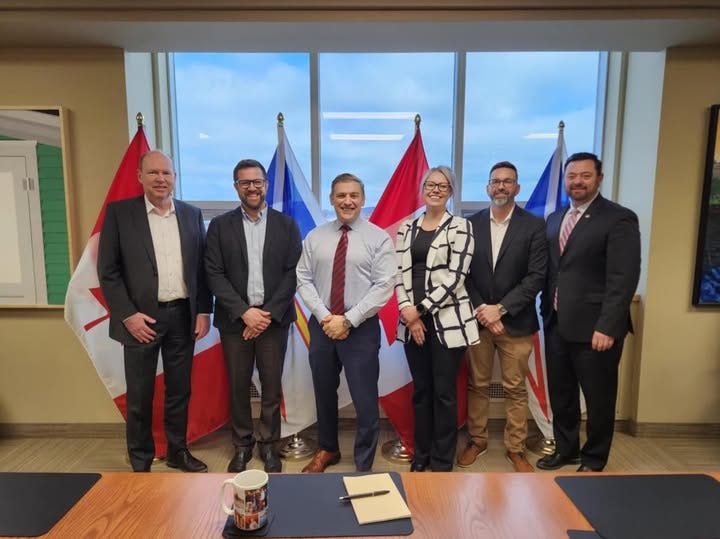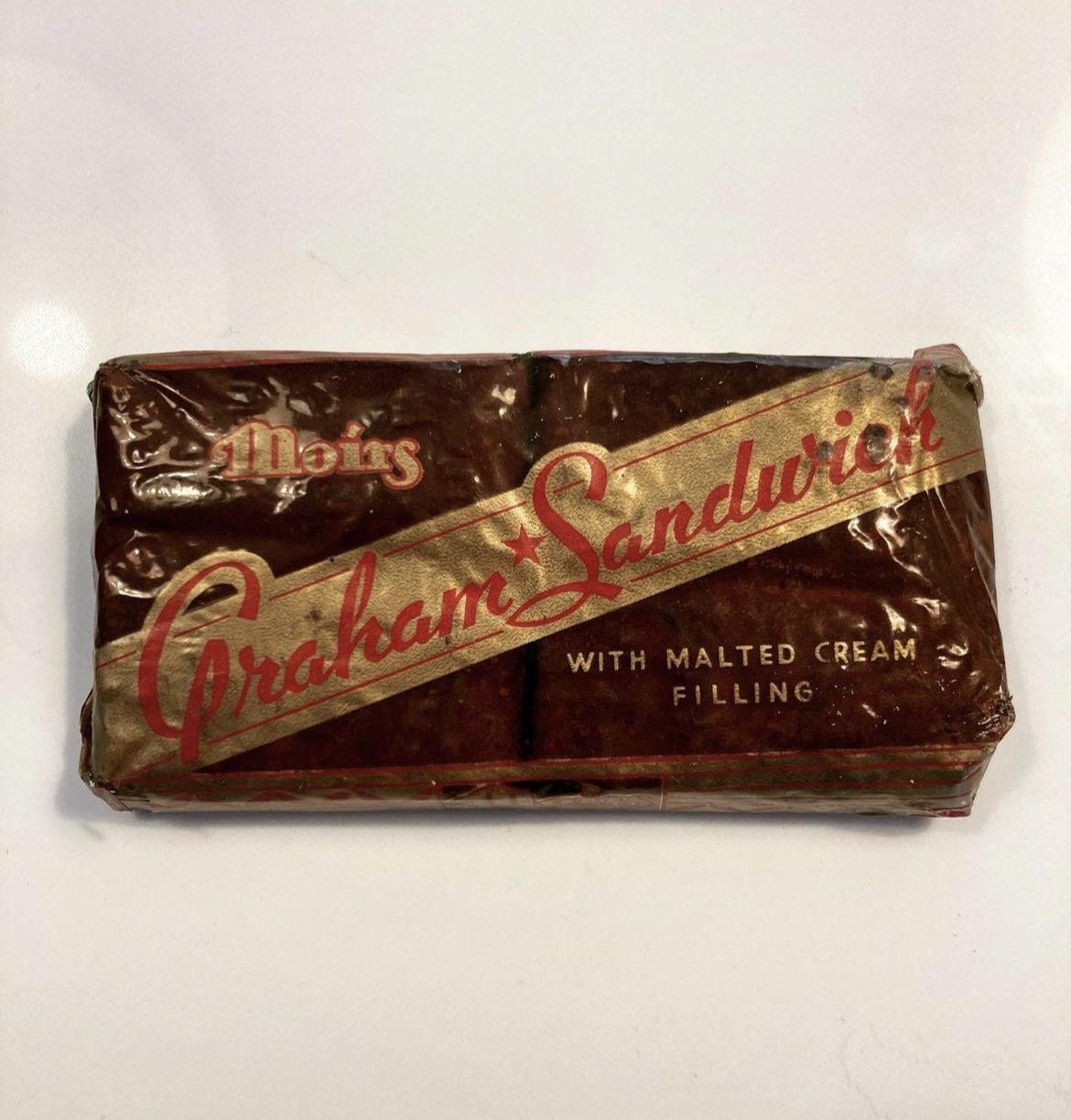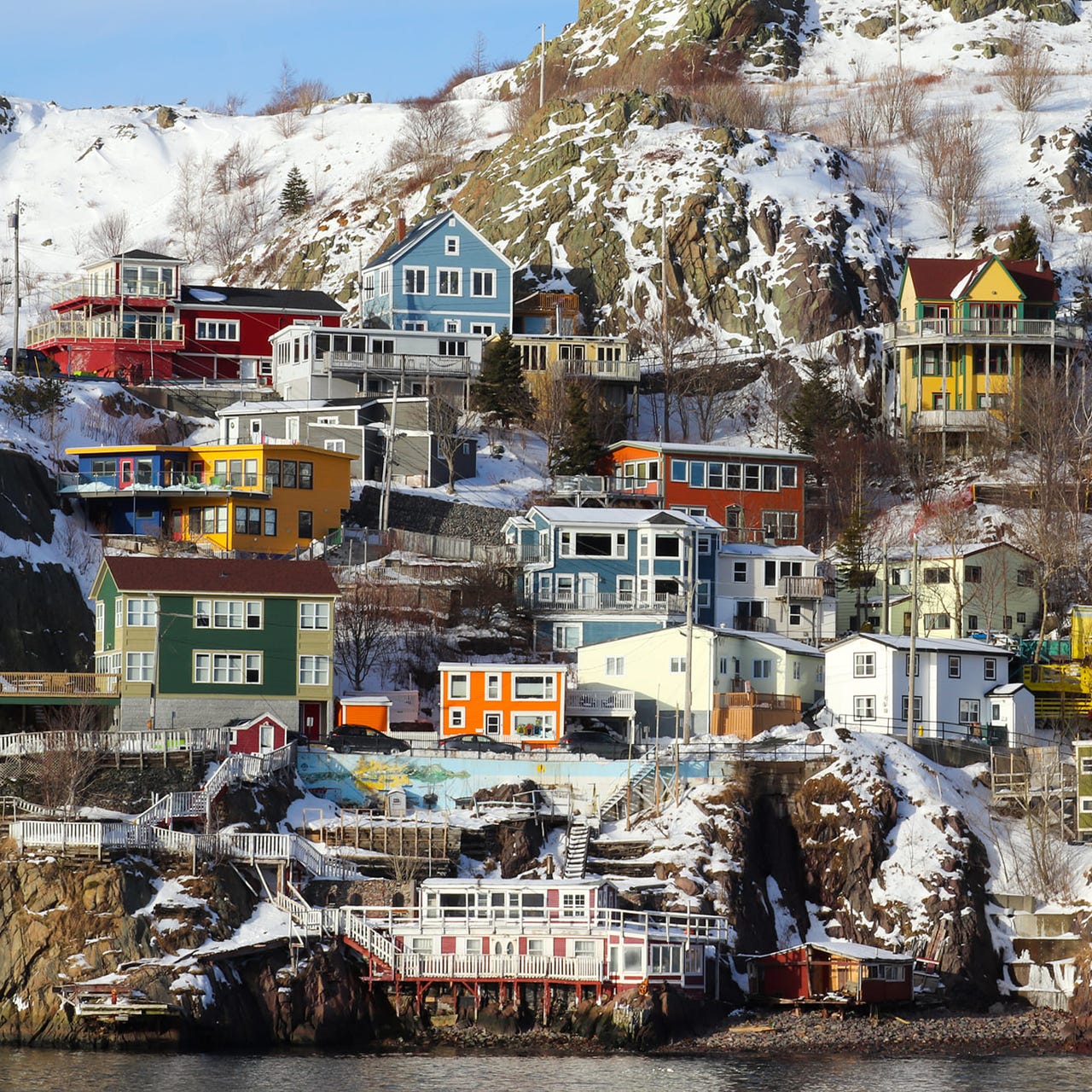
Maybe you were sharing the latest Joe Canuck “I am Canadian” video on Facebook or Insta.
Perhaps you were watching Steve Paikin interview the nonagenarian, ex-WW2 Spitfire pilot Richard Rohmer about his books written so long ago Rohmer was an old man even when his tales of an American invasion of modern Canada hit the bookshelves.
Possibly you were following the latest Sandy Renaldo update on Donald Trump’s shite Miyagi impersonation - tax on, tax off - on CTV or catching growed-up Caillou taking with Dom LeBlanc at precisely the same time Dom was talking to Jake Tapper. (Hint: one or both of the Doms were recorded)
It would be easy to miss on the conventional news media word that Ukraine has agreed to a 30 day cease fire after a lengthy meeting with the AMericans and other in Saudi. The deal has some conditions, including that the Russians agree but as part of the deal the Ukrainians and the Americans have worked out something on rare earth minerals, the Yanks have turned on intelligence sharing again and restored military aid, and the Europeans will be involved in the talks somehow.
None of this fits any of the popular narratives about the confrontation at the White House, Trump as a Russian mole, or that an end to the war that allows the Russians to hang on to some of the land they’ve conquered would be the end of civilization. Especially important to note in all of this is the idea in this deal that American firms would be on the ground in Ukraine and that - horror of horrors to the Russians - there might be NATO peacekeepers in Ukraine even if the Ukrainians didn’t join NATO.
Subscription notice
In Ukraine, neither the Russians nor the Ukrainians want the war to go on. The Ukrainians are using technology to substitute for warm bodies it simply does not have and the sort of military capability that they’d need to decisively beat the Russians in the field. The Russians are using North Korean and potentially Chinese bodies as they run out of all kinds of military equipment and long ago got the last of the easy supply of Russians to fill up hospital beds and body bags.
Expanding the war to hit Russian strategic targets - the big innovation of the past year or so - did not produce the magic result some hoped for or feared when Ukraine started hitting beyond its own borders. The Russians didn’t collapse nor did they go for the nukes, no matter how hard some western experts and the incredibly eternally inexpert Bulletin of the Atomic Scientists assured us they would. The result has been a war reminiscent of Korea or the Great War or Iran-Iraq or any number of other very or very small conflicts that resolved into meat grinders both sides desperately needed to get out of.
On Thursday, the Russians rejected the offer, Donald Trump is promising to rain hell on the Russians, but all of that is just steps toward whatever comes next. No one has any idea of what that will be, including the people in the centre of it. It’s absolutely a normal world for any of them, not knowing what the dawn will bring. There are no guarantees of anything in life for anyone, no guarantees that tomorrow will come let alone that it will unfolded exactly like today or exactly as expected. Life is way more random and complex than most people can handle and when they see the inner chaotic workings of life - as they have these past few weeks - they tend to get upset.
As much as we don’t know what will happen next in Ukraine, there is strategic sense for Ukraine, the Europeans, Canadians, and for the Americans and for the Russians to settle this mess. No one knows how to get from where they are to where they all want to be. They will try different things, just like in dealing with the trade war between Donald Trump’s America and everyone else, you cannot see what’s happening by reading the news headlines and the stuff that appears hot. Look at little things like Peter Navarro, the Trump advisor, telling his imaginary Canadian friends they need to tone down the rhetoric or commerce secretary Howard Lutnick finally speaking publicly not about annexation but a kind of European Union for North America. Look at little things and look at the bigger picture, over a longer time. Hard to do when the conventional and social media are screaming in your face, but it pays off.
Stephen Kotkin is a historian. He’s working on a three part biography of Stalin. Kotkin understands Russia both in its Soviet and modern forms. Speaks the language, literally and figuratively. There’s a fascinating interview with Kotkin in the recent New Yorker in which he turns his attention at one point to the way Donald Trump works and thinks.
“Trump plays good cop with all your strongmen and faux strongmen,” Kotkin explained to David Remnick not long after the confrontation in the White House with Ukrainian President Volodymyr Zelenskyy, “and he then has his staff play bad cop with them; and he plays bad cop with all of our allies, our treaty allies, and he has his staff play good cop with them.”
Now you can see the pattern. Navarro. Lutnick. Trump outbursts.
Again, Trump: this is World Wrestling Entertainment. This is television. DOGE is “The Apprentice,” with Musk sitting in temporarily for Trump, firing people. “You’re fired!” This is a version of government that’s news-cycle-driven, that’s attention-driven, that’s Trump-centric. That’s the reality that you have, some of which is sincere and some of it is reversible, even in sometimes the same news cycle. You work with that—that’s what you have.
The White House is working in all directions all at once and not everything is working out according to any plan, even if there was one. Politics is chaotic, even at the best of times, which is why Andrew Furey’s droning complaint about Trumpian chaos is staggeringly naive for someone working at that level for four years. Kotkin, by contrast, does a tidy job of putting what’s happening today in a larger perspective and a longer term one.
We got here through a string of American administrations, including Trump 45’s and Barak Obama’s, that paid less attention to international security than they needed to so now there are major shifts that will happen. Not just the Americans. The rest of NATO including Canada ignored all these shifts as well, moreso in Canada over the past decade. The world has shifted. America is no longer the manufacturing giant it was and China is a looming threat. But both China and the United States need each other, a fact neither might appreciate just the same as people may not realise that the Putin devil we know may be preferable to another Kremlin strongman who comes from nowhere after the existing regime implodes.
As for the idea that Trump is Russia’s bitch, Kotkin reminds us all that “[Vladimir] Putin thought Trump was going to deliver everything to Russia in his first term, and Trump was much harder on Russia than Obama was then. So you tell me that you can predict what’s going to happen, Trump vis-à-vis China,”…or arguably anything else for that matter, … and I’d join Kotkin in crowing you “king of the world.”
Not just Trump versus China but Trump with everyone else. On Wednesday this week, the Americans slapped 25% tariffs on all imports to the United States of steel and aluminum. Everyone, although if you only watched Canadian media you’d think it was just us. The European Union hit back with tariffs of its own. Britain did not, assuming it can take care of those tariffs in their own free trade agreement which the Brits and Yanks are soon to start negotiating.
On Thursday Trump threatened to add more tariffs on the Europeans but generally, the Trump White House seems acutely aware of the impact tariffs and the threat of tariffs are having domestically. The stock market reflects the real impact of Trump tariffs - almost two trillion dollars in value lost since inauguration - while in many parts of the Republican base, red state voters are already booing their republican congressman and senators. They are pushing back hard against their Republican incumbents, some of who must face voters in the mid-terms in 2026.
Trump and his people will say lots of things at different times, sometimes at the same time. Remember that Kotkin observation about how Trump works. Remember too that when Canadians insist there’s a real threat to Canadian sovereignty in Trump what they are saying is, on some level, equally reactionary. The people who like the way things are don’t want to change. In their world, attacks on our “sovereignty” or “our existence as a state” become synonyms for the Americans want us to do things we don’t want to do, in some cases not because they are bad but just because politically they are unpopular or vested interests like dairy farmers or unions want to protect their little patches.
Complain that Trump is contradictory all you want but, as Kotkin says, that’s what we have to deal with. Consider as well that what we are seeing in Canada is a skewed discussion, affected as much by Trump as domestic exploitation of Trump as boogey-man. There’s a picture of Mark Carney, prime minister-designate, meeting with our “fentanyl czar.” No one asks why we have someone chasing after a drug problem that officially no government in Canada says exists.
So either Canadian governments are lying to the public and there is a massive fentanyl problem that they’ve been hiding or they are pandering to Trump’s rhetoric rather than push back hard against it. No one in the conventional media will dare to tackle that. And through it all, Trump is all about attention, just as Kotkin said. To fight him you have to fight on the ground that matters. Had we spent the couple of billion on an ad campaign and media hits instead of leased Blackhawk helicopters for the Mounties, we might be in a very different place than we are now.
Fundamentally, Canadian leaders still don’t understand what’s going on. This is not just about the change coming later today with a new Prime Minister. The problem of not understanding where we are in Canada and what’s needed is in every single provincial capitol too. Doug Ford, who made a fool of himself and us on Thursday in Washington as well as the federal government that emboldens him are all part of the same muddled morass.

At home, in Newfoundland and Labrador, we are stuck inside a rotting political corpse, zombie politicians from all parties so desperate to get re-elected they stand for everything which means they stand for nothing. This picture shows leaders of the union that represents workers at two American multi-national breweries Andrew Furey and the two other politicians in the picture are protecting from competition at the expense of hundreds of new jobs (potentially on top of the union ones) and millions in new revenue for the provincial government.
Even without a revamped free trade agreement with the Americans, things like alcohol monopolies and supply-managed milk, eggs, and poultry need to go. Had anyone in the dairy industry asked for my advice in the last year or so on what to do about supply management, my reply would have been simple. And it’s not just because philosophically I think supply management is bad public policy for a bunch or reasons or that, as recent opinion polls show, a majority of Canadians don’t want overpriced milk, cheese, eggs or the out-of-date booze policy the crowd in the picture are so proud of.
The Americans came for dairy last time and they will come for it again, regardless of whether the federal free trade team were staring at Trump 47 across the table or Kamala Harris’ negotiator. They will get it, eventually so get ready for the day when supply management is over. Restructure, re-organize, push to expand your production into other provinces so that when the system ends, consolidate farms in the province. Even just freer trade within Canada will be good. You will survive into the future in Newfoundland and Labrador if you change, adapt, and lead.
Letting Americans get into our markets also gives us access to their much bigger market. There might be some losses of jobs and businesses in Canada, but as with things like mustard pickles or frozen pizzas or even ketchup, the Canadian market might not attract American brands or chunks of a given industry. Locals can fill in where the Yanks pull out. The surest way to lose the family farms is to hide them, small and inefficient, behind tariff walls, which is what we have in Canada right now between provinces.
All the forecast horrors of free trade in 1980s - pushed by the unions and others with a blinkered self-interest in the old ways - turned out to be nothing compared to the benefits. I may feel nostalgic for Graham Sandwiches, but I am way more thankful so many other things from across North America are for sale to me way cheaper than they’d be if the pre-1980s thinking was still around. The prosperity we’ve enjoyed since the 1980s across Canada is tied to greater trade and if you want more of that prosperity, more free trade is the way to go. If you don’t know how bad the old days were, look at the inflation and financial losses in the United States and Trump is just starting with his ludicrous tariffs.
There are opportunities in front of us, but whether in Lumsden or Lviv, we have to known when to hold on to what we’ve got and when to go for something different, something, new, and likely much better.






If we had no trade barriers, we would be in a much better position to sell Hydro Power to US consumers too. The fact that we have to “negotiate” with Quebec should be a red flag. We have all just gotten used to it in our brains. Far as I know, when Oil companies pipes oil from Alberta to Texas, there isnt a separate “deal” with each state. States stay out of businesses business in the US. Thats what we need
Great article!
Let’s get rid of all the make believe walls, and give our businesses unlimited access to the biggest consumer group in the world. There might be some adjustments, but in the end we are all better off.